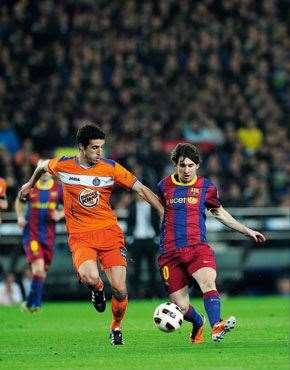American and European sports have long been the home of clean skin jerseys and fields … until now.
American and European sports have long been the home of clean skin jerseys and fields … until now.
 Burger King’s – err Getafe’s – Ivan Marcano Sierra vies with Barcelona’s Lionel Messi. Image: Getty Images
Burger King’s – err Getafe’s – Ivan Marcano Sierra vies with Barcelona’s Lionel Messi. Image: Getty Images
Your columnist once worked for a basketball league in the Philippines; an outpost of professional sport if there ever was one. Apart from having what must be the shortest group of players in pro hoops, what outside observers would find most remarkable were the team names: the Beermen, the Rhum Masters, the Tender Juicy Hot Dogs (who were, naturally, rivals with another outfit known as the Mighty Meaty Hot Dogs).
The reason for such colourful nomenclature was that teams were linked to a company, rather than a city, suburb or other locality. The Beermen, then, were wholly a marketing vehicle for the San Miguel Corporation. It’s not an entirely uncommon practice in Asia – Japanese baseball operates in much the same way, which is why they have such gems as the Nippon-Ham Fighters.
It’s hard not to think of the Hot Dogs and Ham Fighters when the issue of naming rights or sponsor logos on uniforms comes up. The athlete as billboard (not to mention their team, or the ground they play, or the comp they’re contesting) is an unfortunate consequence of professional sport, but one that is a necessary evil. It’s become so ubiquitous in Australia that we’ve grown accustomed to it, although you do wonder if foreigners thought that our football teams, sponsored by the Quit anti-smoking campaign, were engaged in some kind of funky experiment in negative reinforcement.
As hyper-commercialised as American sport has been, Australian observers would often comment favourably at the cleanskin uniforms and fields of the major US sports. This facade has, however, begun to crack, as teams are seeing revenue streams being reduced to trickles. Sports marketing firms predict that sponsors will start grabbing this formerly sacrosanct space; the NFL already allows logos on practice uniforms – a first step down the path to the other extreme of American sport, exemplified by the rolling advertisements of NASCAR.
Next month, FC Barcelona will don a kit bearing the mark of a sponsor for the first time. In a volte-face that can only be explained by that European talent for ambiguity, the club will go from paying money to display the Unicef logo to receiving $205 million over five years from the Qatar Foundation, the richest deal of its kind (the team will retain the Unicef logo in another space, and its donation). Barcelona had long-resisted selling out, but facing debts of $550 million-plus will motivate club officials in unprecedented ways.
As the old saying goes, the name on the front of the shirt is indeed more important than the one on the back. The scarlet-and-blue Barca strip is so iconic that it doesn’t need to say where the team comes from, but now will read “Qatar”. It’s ultimately a sign of the times. The footballing pride of Catalonia, employer of an Argentine who is his generation’s great player, is underwritten by the cash of a Middle Eastern gulf state. A basketball team in New Jersey, set to move to Brooklyn, acquires a new star from Utah, his salary paid by a Russian billionaire. Union teams are set up in Melbourne and AFL sides in Sydney, expat operations driven by dreams of market size.
So the thought occurs: the notion that a team comes from a place, that that location is part of its identity, is as quaint as loyalty to the jumper. Teams represent companies, and sometimes that company is the team itself. They might as well all be playing for meat processing firms now ...
– Jeff Centenera
Related Articles

Tiger and Nike part ways after 27-year partnership

Morri: Slumbers is a “voice of reason and wisdom”













